|
|
|
Sort Order |
|
|
|
Items / Page
|
|
|
|
|
|
|
| Srl | Item |
| 1 |
ID:
132552
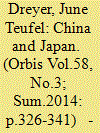

|
|
|
|
|
| Publication |
2014.
|
| Summary/Abstract |
According to integration theory, growing economic interdependence between China and Japan should have spilled over into more cordial political relations. The opposite occurred, as summarized in the phrase "hot economics, cold politics." Even as both sides acknowledge the value of cooperation for shared benefit, commercial and strategic rivalries have intensified, calling into question the validity of integration theory.
|
|
|
|
|
|
|
|
|
|
|
|
|
|
|
|
| 2 |
ID:
118313


|
|
|
|
|
| Publication |
2013.
|
| Summary/Abstract |
China's rapid rise in economic and military power has occurred alongside the apparent decline of Japan, which has traditionally been America's closest ally in the post-World War II era. These shifting fortunes have led policymakers in all three capitals to reassess security relationships with the other two. This article predicts that, absent marked changes in the current distribution of power, Washington must deal with China as an equal partner while expecting that Japan will try to placate both sides even as it remains closer to Washington.
|
|
|
|
|
|
|
|
|
|
|
|
|
|
|
|
| 3 |
ID:
004546
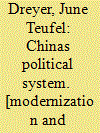

|
|
|
|
|
| Publication |
Houndmills, Macmillan, 1993.
|
| Description |
448p.
|
| Standard Number |
0333594886
|
|
|
|
|
|
|
|
|
|
|
|
Copies: C:1/I:0,R:0,Q:0
Circulation
| Accession# | Call# | Current Location | Status | Policy | Location |
| 035331 | 321.00951/DRE 035331 | Main | On Shelf | General | |
|
|
|
|
| 4 |
ID:
049518


|
|
|
|
|
| Edition |
2nd rev ed
|
| Publication |
Hampshire, macmillan Press, 1996.
|
| Description |
xiv, 349p.
|
| Standard Number |
0333668502
|
|
|
|
|
|
|
|
|
|
|
|
Copies: C:1/I:0,R:0,Q:0
Circulation
| Accession# | Call# | Current Location | Status | Policy | Location |
| 038223 | 321.00951/DRE 038223 | Main | On Shelf | General | |
|
|
|
|
| 5 |
ID:
047455
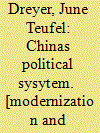

|
|
|
|
|
| Edition |
3rd ed
|
| Publication |
London, Macmillan, 2000.
|
| Description |
xvii, 347p.
|
| Standard Number |
033391287X
|
|
|
|
|
|
|
|
|
|
|
|
Copies: C:1/I:0,R:0,Q:0
Circulation
| Accession# | Call# | Current Location | Status | Policy | Location |
| 043355 | 321.00951/DRE 043355 | Main | On Shelf | General | |
|
|
|
|
| 6 |
ID:
082282


|
|
|
| 7 |
ID:
068084
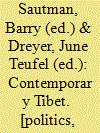

|
|
|
|
|
| Publication |
Armonk, M E Sharp, 2006.
|
| Description |
vii, 360p.hbk
|
| Standard Number |
0765613549
|
|
|
|
|
|
|
|
|
|
|
|
Copies: C:1/I:0,R:0,Q:0
Circulation
| Accession# | Call# | Current Location | Status | Policy | Location |
| 050948 | 951.506/SAU 050948 | Main | On Shelf | General | |
|
|
|
|
| 8 |
ID:
050860


|
|
|
| 9 |
ID:
155255
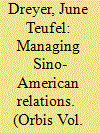

|
|
|
|
|
| Summary/Abstract |
Past Chinese policy has proved deficient in managing the Sino-American relationship. Your administration should break with past assumptions, cease allowing China to set the agenda, be aware of specious Chinese claims based on distortions of history, avoid using meaningless or misleading terms in speaking of the relationship, be cognizant of the tendency of some China specialists to self-censor, establish clear guidelines for the limits of U.S. tolerance of Chinese behavior, and be prepared to respond forcefully if they are transgressed Be aware that failure to do so will be regarded as acquiescence to Chinese claims and an invitation to advance future claims.
|
|
|
|
|
|
|
|
|
|
|
|
|
|
|
|
| 10 |
ID:
143268


|
|
|
|
|
| Summary/Abstract |
The assertive actions China has taken to press its claims in the East China and South China seas since 2010 indicate that its leadership has decided that the time has come to end Deng Xiaoping's advice to “hide [the country's capabilities] and bide [its time].” Beijing has combined economic incentives and sanctions with small but incrementally meaningful military pressures. Efforts by neighboring states to form a countervailing coalition have thus far proved ineffective. Beijing's tactics have been stunningly successful, though there are financial, structural, and resource weaknesses within China that indicate that the effort to assert control over the area will remain unrealized.
|
|
|
|
|
|
|
|
|
|
|
|
|
|
|
|
| 11 |
ID:
112434
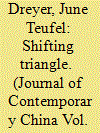

|
|
|
|
|
| Publication |
2012.
|
| Summary/Abstract |
The September 2010 collision between a Chinese fishing boat and a Japanese coast guard ship showed the ambiguities in American policy on the Diaoyu/Senkaku Islands. On the one hand, Washington has said that it takes no position on the sovereignty of the islands; on the other, it is bound by the terms of the US-Japan security treaty to defend the islands. In a larger context, the incident highlighted a geopolitical dilemma for Japan: how to position itself between a rising China and a United States that seems to be in a state of decline. China, on the rise, seems to be testing its role with regard to the other two powers. The United States, which also sees itself in decline, is asking similar questions. The waxing and waning power of Russia exerts additional counter-pressures.
|
|
|
|
|
|
|
|
|
|
|
|
|
|
|
|
| 12 |
ID:
080489


|
|
|
|
|
| Publication |
2007.
|
| Summary/Abstract |
As the world's first and second largest energy consumers, the United States and the People's Republic of China face serious common challenges that include increasing dependence on foreign sources, high energy costs, and increased environmental impacts. The energy security of both can be enhanced through cooperation. The US is a leader in many fields of energy research and technology, and the PRC has achievements of its own in such fields as high-energy physics, coal sequestration, and next-generation nuclear reactors. Promising steps have already been taken. Extensive bilateral energy dialogues exist at both policy and working levels. An energy policy dialogue between America's Department of Energy and its Chinese counterpart was inaugurated in 2004. The two sides are working together on 'smart buildings'. There are proposals for joint hydrogen development. Potential for further progress exists in these and other areas including air pollution and control, water treatment, solid waste treatment and disposal, renewable energy, pollution control, and energy efficiency equipment. Nonetheless, sovereignty issues remain, and both sides continue their desire for energy independence.
|
|
|
|
|
|
|
|
|
|
|
|
|
|
|
|
| 13 |
ID:
020079


|
|
|
|
|
| Publication |
Aug 2001.
|
| Description |
373-386
|
| Summary/Abstract |
China's relations with Japan over the past several decades have been cyclical, with periods of relative cordiality interspersed with episodes of contention. Since 1995, however, the Beijing leadership has perceived a hardening of attitudes on the Japanese side in ways that are inimical to long-term amicable relations with the People's Republic of China. This has been mirrored in Tokyo, which sees Chinese behavior as increasingly provocative. The policy directions of the two states appear more divergent as well. Periodic slight thaws in relations and numerous joint projects notwithstanding, the problems between the two defy easy solution, and may be intractable. Weak leadership in both countries may encourage extremists in each to become more assertive.
|
|
|
|
|
|
|
|
|
|
|
|
|
|
|
|
| 14 |
ID:
148094


|
|
|
|
|
| Summary/Abstract |
Under the administration of Taiwan's first woman president, Tsai Ing-wen, Taiwan-Japan relations are likely to deepen while relying, as far as possible, on non-governmental and quasi-governmental working relationships. This reflects the Japanese government's desire to avoid friction with China while endeavoring to protect its strategic and economic interests by partnering with Taiwan. Concern about these developments is already evident in the People's Republic of China.
|
|
|
|
|
|
|
|
|
|
|
|
|
|
|
|
| 15 |
ID:
141452


|
|
|
|
|
| Summary/Abstract |
The tianxia trope has been advanced as an organizing principle for post-Cold War international relations encompassing the rise of the People's Republic of China. The tianxia system is defined as a Sino-centric hierarchical relationship among unequals, governed according to Confucian principles of benevolence. As traditionally practiced, it incorporated an important role for the observance of ritual, including the presentation of tribute to the emperor as Son of Heaven, purportedly resulting in a Pax Sinica. Its supporters believe that, if adopted in today's world, tianxia would constitute a great improvement over the anarchic Westphalian system of theoretically equal states who possess sovereignty, i.e. inviolability within their own borders. Because they answer to no superior authority, the Westphalian system is by its very nature conducive to discord and war. This article will argue that both the tianxia and Westphalian systems have serious flaws and were rarely practiced as either their proponents or detractors argue. However, even states whose domestic autonomy is compromised by internal dissent and whose weaknesses prevent their playing an influential role internationally have vested interests in maintaining adherence to the Westphalian system, if only as a bargaining position. The PRC government itself has accepted the principles inherent therein through such actions as joining the United Nations and becoming a signatory of the Five Principles of Peaceful Coexistence. It zealously defends its sovereign prerogatives when useful, even as it makes efforts to educate the world on the virtues of a Confucian Great Harmony, and its supporters advocate following a somewhat nebulously defined Chinese model. In the absence of compelling incentives for major players in the current international system to adopt the tianxia system, Westphalian sovereignty appears likely to remain the organizing principle of international relations for the foreseeable future, its serious deficiencies notwithstanding. To paraphrase Winston Churchill's remarks on democracy, it may be the worst form of government except for all the others.
|
|
|
|
|
|
|
|
|
|
|
|
|
|
|
|
| 16 |
ID:
083865


|
|
|
|
|
| Publication |
2008.
|
| Summary/Abstract |
China and the United States have been talking past each other on a variety of issues ever since the normalization process began. To some extent, this enables each side to avoid repercussions from domestic critics and facilitate correct diplomatic relations. But on matters that broadly concern trade, the military, and Taiwan, it can cause considerable friction. Many of the more unpleasant episodes between the two nations have arisen as a result of unexpected and unpredictable events. The United States should address what of the trade imbalance is due to internal shortcomings before pressing the Chinese government to make changes in its economic system. While Washington should be mindful of the security dilemma, it would be unwise to ignore the implications of the PRC's continuing military buildup. Statements of peaceful intentions do not necessarily mean that peace is assured. Iterations of unambiguous commitment to the peaceful resolution of the status of Taiwan are important to the maintenance of peace. The United States and China are linked by market forces that Washington encouraged the creation of. America and China can get along without being enamored of each other's social system.
|
|
|
|
|
|
|
|
|
|
|
|
|
|
|
|
|
|
|
|
|